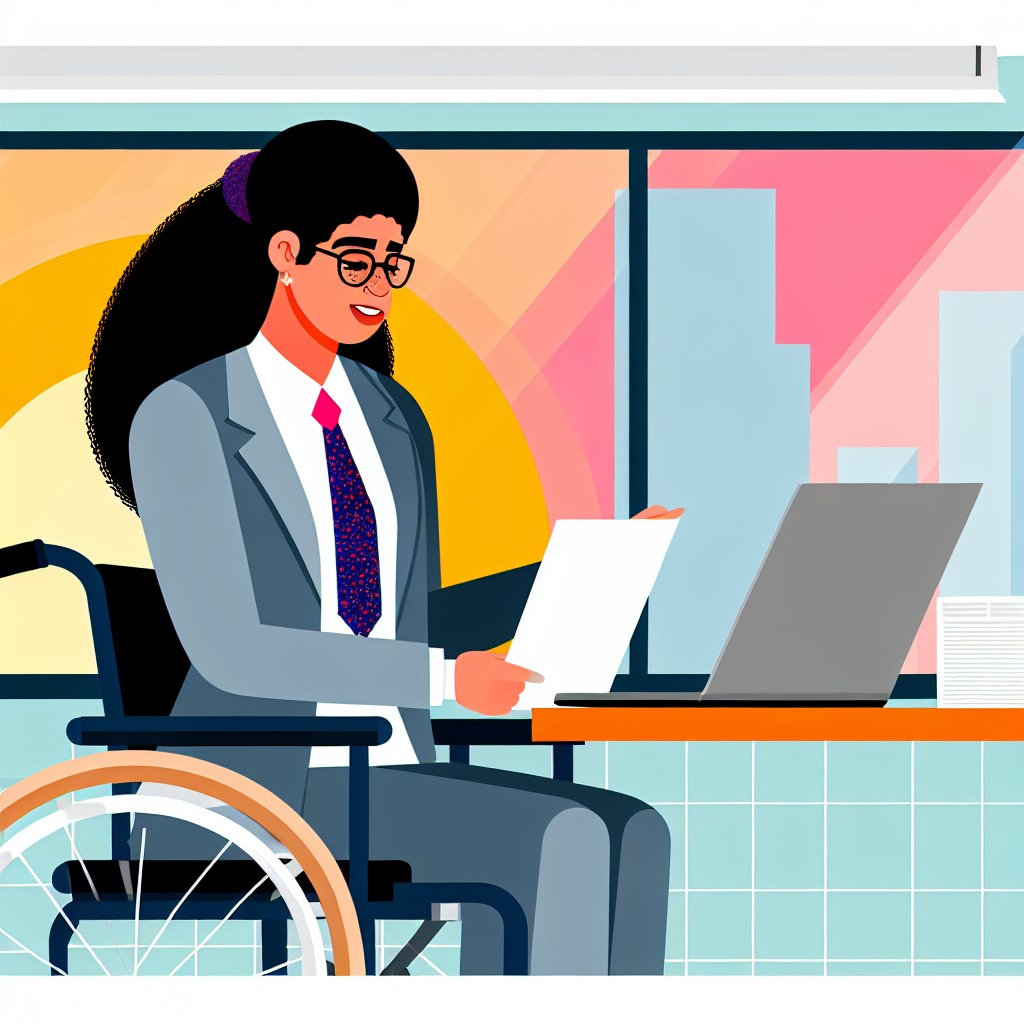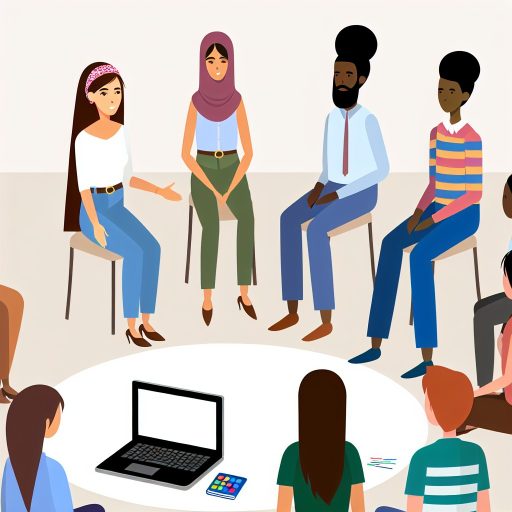Introduction
Role of Disability Services Coordinators:
Disability Services Coordinators play a vital role in providing support and resources to individuals with disabilities.
Importance of work environment:
Creating a conducive work environment is crucial for Disability Services Coordinators to effectively fulfill their responsibilities.
Key Factors for a Positive Work Environment
- Accessibility: Ensure the workplace is accessible for both staff and clients with disabilities.
- Training and Development: Provide ongoing training to enhance skills in supporting individuals with diverse needs.
- Collaboration: Encourage collaboration with colleagues, clients, and community partners to improve service delivery.
- Flexibility: Allow for flexible work arrangements to accommodate individual needs and preferences.
- Supportive Leadership: Foster a culture of support and understanding among team members and supervisors.
Benefits of a Positive Work Environment
- Increased Productivity: Employees are more motivated and engaged when working in a supportive environment.
- Enhanced Job Satisfaction: Workers feel valued and appreciated, leading to higher job satisfaction levels.
- Improved Outcomes: Better support and services for individuals with disabilities result in improved outcomes and quality of life.
- Retention and Recruitment: A positive work environment attracts and retains talented staff, creating a more dynamic team.
- Overall Well-Being: Staff members experience less stress and better overall well-being in a supportive work environment.
Understanding the Needs of Individuals with Disabilities
Disability Services Coordinators need a deep understanding of specific needs and challenges.
Different types of disabilities require appropriate support services for individuals.
Physical disabilities may require accommodations for mobility and accessibility.
Sensory disabilities such as blindness or deafness may need specialized communication support.
Intellectual disabilities may require tailored learning materials and support in academic settings.
Mental health disabilities may require counseling services and mental health support.
Chronic health conditions may require medical accommodations and flexibility in work schedules.
Developmental disabilities may require individualized support plans and behavioral interventions.
Each type of disability comes with unique challenges that require specific support services.
Disability Services Coordinators must be knowledgeable about the resources available for each disability.
Accessibility and Accommodation
- It is crucial to ensure that the work environment is accessible for employees with disabilities.
- Accessibility allows individuals with disabilities to perform their job duties effectively.
- Accessible work environments also benefit clients seeking assistance from Disability Services Coordinators.
- For clients, accessibility ensures that they can easily access the services they require.
- Disability Services Coordinators play a vital role in advocating for accessibility measures.
- They collaborate with management to implement reasonable accommodations for employees with disabilities.
- Coordinators assess the workplace to identify areas where modifications are needed for accessibility.
- They work towards eliminating physical barriers that may hinder employees with disabilities in performing their tasks.
- Coordinators also help in providing assistive technologies to support employees in their roles.
- Advocating for accessibility ensures inclusivity and equal opportunities for all individuals in the workplace.
Role of Disability Services Coordinators
- Disability Services Coordinators advocate for reasonable accommodations to support employees with disabilities.
- They serve as a liaison between employees, management, and HR to address accommodation needs.
- Coordinators work closely with individuals to understand their specific requirements for accommodations.
- They communicate with relevant stakeholders to ensure that accommodations are implemented effectively.
- Coordinators provide guidance on how to create an inclusive work environment for all employees.
- They stay updated on laws and regulations related to disability accommodations in the workplace.
- Coordinators conduct training sessions to educate employees on disability etiquette and inclusivity.
- They collaborate with external organizations to access resources for implementing accessibility measures.
- Coordinators promote a culture of acceptance and support for individuals with disabilities within the organization.
- Disability Services Coordinators play a pivotal role in ensuring a conducive work environment for all.
Delve into the Subject: Essential Skills for a Successful Public Health Social Worker
Training and Professional Development
Providing ongoing training and professional development opportunities for Disability Services Coordinators is essential for their success.
These opportunities improve the quality of services they provide.
- Emphasize the importance of continuing education to keep up with evolving best practices in the field.
- Invest in workshops, seminars, and conferences to expand knowledge and skills in disability services.
- Encourage participation in webinars and online courses to stay updated on the latest trends and advancements.
- Support membership in professional organizations to network with colleagues and access resources for growth.
Staying updated on laws and regulations related to disability services is crucial for coordinators.
This knowledge helps them effectively serve individuals with disabilities.
- Regularly review and understand federal and state laws that govern disability rights and accommodations.
- Stay informed about changes in legislation that may impact service delivery and student support.
- Attend training sessions on compliance and ethical guidelines to ensure adherence to legal requirements.
- Collaborate with legal experts or consultants to address complex legal issues or policy changes.
By prioritizing training and professional development, Disability Services Coordinators can enhance their knowledge and skills.
Transform Your Career Today
Unlock a personalized career strategy that drives real results. Get tailored advice and a roadmap designed just for you.
Start NowThis focus increases their effectiveness in supporting individuals with disabilities.
Learn More: Advocacy Role of Disability Services Coordinators
Collaboration and Communication
- Collaboration and communication are essential in the work environment of Disability Services Coordinators.
- Building relationships with colleagues fosters a sense of teamwork and unity in serving individuals with disabilities.
- Effective communication ensures that all team members are on the same page and working towards common goals.
Value of Fostering Collaboration
- Collaboration allows Disability Services Coordinators to pool their expertise and resources, providing comprehensive support.
- Shared knowledge and skills among team members lead to better decision-making and outcomes for individuals with disabilities.
Importance of Communication
- Open lines of communication promote transparency, trust, and accountability within the team.
- Clear and effective communication helps to avoid misunderstandings and ensures that everyone is informed and involved.
Benefits of Working Together
- Collaboration streamlines processes, reduces duplication of efforts, and maximizes the use of available resources.
- Working together allows Disability Services Coordinators to address the diverse needs of individuals with disabilities holistically.
Approaches to Supporting Individuals with Disabilities
- By collaborating and communicating effectively, Disability Services Coordinators can offer tailored support and services to meet individual needs.
- Coordinating efforts with external stakeholders such as healthcare providers or educators ensures a seamless and holistic approach to supporting individuals with disabilities.
Delve into the Subject: Innovative Approaches in Family Support Services
Emotional Support and Self-Care
Supporting individuals with disabilities can be emotionally taxing for Disability Services Coordinators.
Self-care is crucial to prevent burnout and compassion fatigue in this profession.
Strategies for Managing Stress
- Practice mindfulness techniques, such as deep breathing or meditation, to reduce stress levels.
- Engage in physical exercise regularly to release built-up tension and clear your mind.
- Take short breaks throughout the day to de-stress and refocus your energy.
- Establish a routine to maintain a sense of structure and control amidst unpredictable situations.
Setting Boundaries
- Clearly define your role and responsibilities to avoid taking on more than you can handle.
- Learn to say no when necessary to protect your time and energy from being overextended.
- Establish healthy boundaries with clients to maintain a professional relationship while still offering support.
Seeking Support
- Attend regular supervision sessions with a mentor or supervisor to discuss challenging cases and receive guidance.
- Participate in peer support groups or networking events to connect with others in the field and share experiences.
- Consider seeking professional counseling or therapy to process your emotions and cope with the demands of the job.
- Utilize employee assistance programs or mental health resources provided by your organization for additional support.
By prioritizing emotional support and self-care, Disability Services Coordinators can better serve individuals with disabilities.
This approach helps maintain their own well-being and prevents burnout.
Delve into the Subject: Essential Resources for Housing Coordinators

Flexibility and Adaptability
One of the key traits that Disability Services Coordinators must possess is flexibility.
They need to be able to adapt to the diverse needs and preferences of individuals with disabilities.
Adjusting support services is essential to meet the unique requirements of each person.
Communication styles should also be flexible to ensure effective interaction with individuals.
Work processes may need to be adapted to accommodate different situations and challenges.
Importance of Flexibility
- Flexibility allows Disability Services Coordinators to respond promptly to changing circumstances.
- It enables them to tailor their approach to meet the specific needs of each individual.
- Being flexible fosters a culture of inclusivity and understanding in the work environment.
Need for Adaptability
- Adaptability is crucial for responding effectively to the evolving needs of individuals with disabilities.
- It allows Disability Services Coordinators to overcome challenges and find creative solutions.
- Adapting support services ensures that individuals receive the assistance they require to thrive.
Adjusting Communication Styles
- Being adaptable in communication helps in establishing rapport and trust with individuals.
- Customizing communication styles based on individual preferences enhances understanding and engagement.
- Effective communication is key to providing quality support services to individuals with disabilities.
Adapting Work Processes
- Adjusting work processes to accommodate different situations promotes efficiency and effectiveness.
- Adaptability in work processes ensures that tasks are completed in a timely and accurate manner.
- Flexibility in work processes allows Disability Services Coordinators to meet the changing needs of individuals.
Flexibility and adaptability are essential qualities that Disability Services Coordinators must possess.
By being flexible and adaptable, they can provide tailored support services that meet diverse needs.
Adjusting communication styles and work processes is vital in creating an inclusive and supportive work environment.
Advocacy and Empowerment in Disability Services
Disability Services Coordinators play a crucial role in advocating for individuals’ rights.
They strive to empower clients by promoting self-advocacy, inclusivity, and independence.
Advocacy includes speaking up for clients to ensure fair treatment and opportunities.
Coordinators educate clients about their rights and help them assert themselves.
Transform Your Career Today
Unlock a personalized career strategy that drives real results. Get tailored advice and a roadmap designed just for you.
Start NowThey assist clients in navigating systems and accessing necessary resources.
Coordinators help address barriers that limit inclusion within the community.
They collaborate with clients to develop effective advocacy strategies and goals.
Empowerment involves fostering agency, confidence, and autonomy in clients.
Coordinators encourage clients to voice their needs, preferences, and goals.
They facilitate client participation in decision-making and self-expression opportunities.
Promoting respect, understanding, and acceptance of diversity is essential within the community.
Empowerment also includes providing education, skills training, and mentorship.
Coordinators create a supportive environment that celebrates clients’ strengths and abilities.
They advocate for equal access to education, employment, healthcare, and housing.
Coordinators work with professionals to address systemic barriers and promote inclusivity.
Participation in policy development and community awareness campaigns advances disability rights.
Coordinators provide ongoing support, guidance, and encouragement to clients.
They advocate for reasonable accommodations and assistive technologies to aid independence.
Empowerment promotes social connections, self-determination, and community engagement.
Disability Services Coordinators empower clients to advocate for themselves effectively.
They help clients navigate challenges and lead fulfilling, independent lives.
Key Elements for an Effective Disability Services Coordination Environment
Creating a conducive work environment for Disability Services Coordinators requires prioritizing accessibility.
Collaboration among team members supports a holistic approach to diverse needs.
Self-care is vital to maintain well-being and to prevent burnout.
Transform Your Career Today
Unlock a personalized career strategy that drives real results. Get tailored advice and a roadmap designed just for you.
Start NowFlexibility enables adjustment to changing circumstances and individual requirements.
Advocacy involves actively supporting the rights and needs of individuals with disabilities.
Empowerment encourages independence and self-advocacy among service users.
By incorporating accessibility, collaboration, self-care, flexibility, advocacy, and empowerment into the work environment, Disability Services Coordinators create a supportive atmosphere.
This approach maximizes the impact and effectiveness of their services.
Prioritizing these elements promotes inclusivity and enhances the quality of care provided.
Additional Resources
Children’s Long-Term Support Program | Wisconsin Department of …




